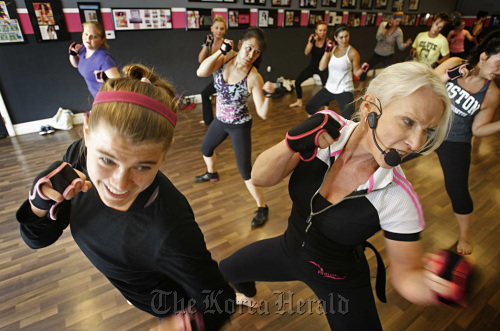LOS ANGELES ― Most people would not think of combining seemingly polar opposite pursuits such as Pilates and boxing. But the odd pairing makes perfect sense to one fitness instructor.
Former dancer and certified Pilates teacher Viveca Jensen thought the mindful core-strengthening properties of Pilates would complement and counterbalance the quick cardio-heavy pace of noncontact boxing with weighted gloves. The class she created, called Piloxing, is a prime example of a fusion fitness class, one that melds two often disparate disciplines and throws in an element of fun to create a comprehensive, challenging workout.
 |
Viveca Jensen, right, and Sara Vorce lead a class in Toluca Lake, California on May 11. (Los Angeles Times/MCT) |
“These combination classes are really popular right now,” says Pat Soley, group exercise director at The Sports Club/LA. That gym offers a class called “The Barre Code,” which combines ballet moves, Pilates and core conditioning. “Some people found that they didn’t need a whole Pilates mat class, or they didn’t want to stretch for an hour. They want to gain the benefits of different disciplines, but they want to compress it.”
Jensen, whose main studio is in Toluca Lake, came up with Piloxing because she wanted to offer a class that featured cardio, core strength, alignment and balance. She even threw a little dance into the mix. “I wanted to incorporate it all in an hour,” she says. “Those disciplines may seem like they’re disconnected from each other, but they really do go together.” The class is divided into blocks of high-intensity cardio (the boxing) with more moderate core work and dance.
The world of fusion classes has expanded to include increasingly popular core training combined with group cycling; ones that fuse Pilates, yoga and calisthenics; hybrids that incorporate ballet barre work with boot camp; and sessions that combine high-intensity cardio with vinyasa yoga.
Other types of fusion classes blend a workout with something completely unrelated, such as a class called “Pound” ― Pilates with drumming.
Creators Cristina Peerenboom and Kirsten Potenza wanted to combine the best aspects of Pilates with something that added a more exciting element. “My stool was broken on my drum kit,” says Peerenboom, a certified Pilates mat instructor, “and I was drumming while squatting over my kit. I realized all the muscles in my core and my body were working at once.”
That light bulb moment became the class, now offered at Crunch Fitness in Los Angeles. While doing core moves ― either standing or sitting on mats ― students keep the beat with lightly weighted drumsticks. Drumming not only adds some enjoyment to the exercise, but moving the arms with the sticks also forces the body to work harder to keep the core stabilized.
“I’ve been running marathons and doing Pilates for a while, and to be honest I was completely burned out,” Peerenboom says. “I thought, if I could make this a clever workout, you could get even better benefits than normal Pilates without having an obsessive workout. You really get into the music while you’re working out.”
As discretionary time becomes more and more scarce for many people, a one-hour class that offers various elements such as stretching, resistance training and cardio becomes more appealing. It’s also a good way to dip a toe into a workout that might be intimidating for first-timers, such as yoga or boxing.
“If (a fusion class) can get someone to do boxing when they’ve never tried something like that before, great,” says Neal Pire, president of New Jersey-based Inspire Training Systems and a fellow of the American College of Sports Medicine. “Or maybe they’ve done Pilates before but private classes are too expensive. A Pilates/boxing class might be a good answer, and it might turn them on to doing more activity.”
But for purists, combining disciplines may not be such a good thing if basic principles and techniques get watered down. Some fear that the tenets of yoga might be lost, traditional ballet positions could turn sloppy and a mean right hook could lose its sting.
Not everyone is worried. “I don’t care what people do,” Pire says, “as long as they move and are going to get some kind of healthy benefit, feel good and become less stressed.”
“If someone is looking for a pure Pilates experience, then they should take a pure Pilates class,” says Shirley Archer, a Florida-based former IDEA Health & Fitness Association instructor of the year and author of “Fitness 9 to 5: Easy Exercises for the Working Week.” “But if you’re just interested in experiencing a new kind of class, then it’s great to do something that combines things you may be interested in.”
Fusion classes, Archer adds, “tend to be developed by fitness professionals who understand and design movements in a responsible way. People should be able to get a good workout even though it may not be a pure discipline.” A good teacher should correct a bad plie to prevent an injury, she says, but not whack someone’s calf with a yardstick for an imperfect turnout.
How does a prospective student know whether a fusion class achieves the right blend of fitness, fun and technique? Instructors should have a reputable certification or solid teacher training. Pire recommends asking current students what they like about a class.
Felicia Linksy has lost 30 pounds and 14 inches since starting Piloxing last August. The L.A. hair and makeup artist has tried traditional boxing and Pilates but was looking for something more affordable that would fit into her hectic schedule.
Mixing the workouts provides gains, she says. “The boxing moves incorporate the elongation of the body from Pilates. When you go to do a jab, your follow-through is more extended. By getting those extensions you get that much more benefit.”
By Jeannine Stein
(Los Angeles Times)
(McClatchy-Tribune Information Services)








